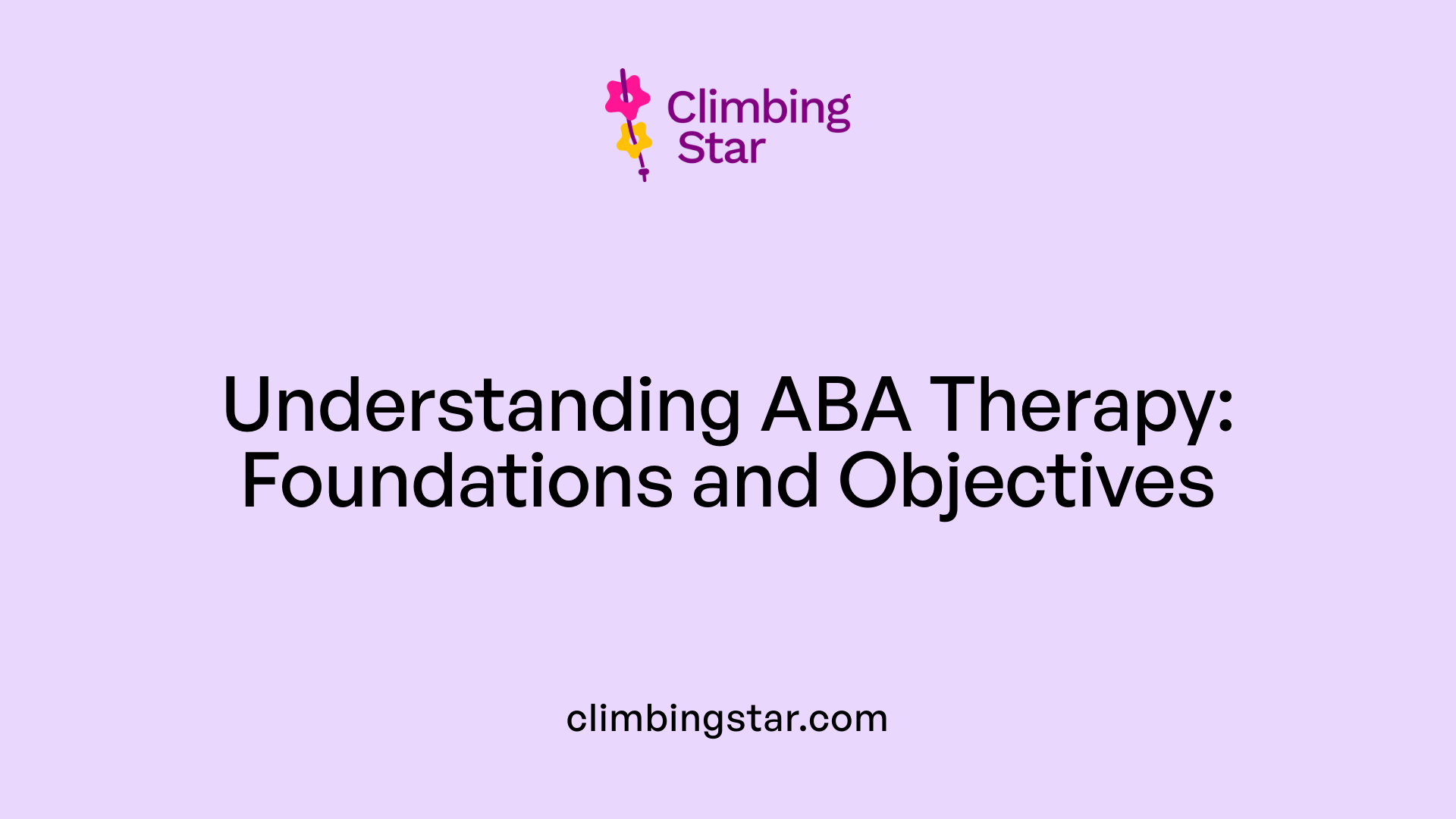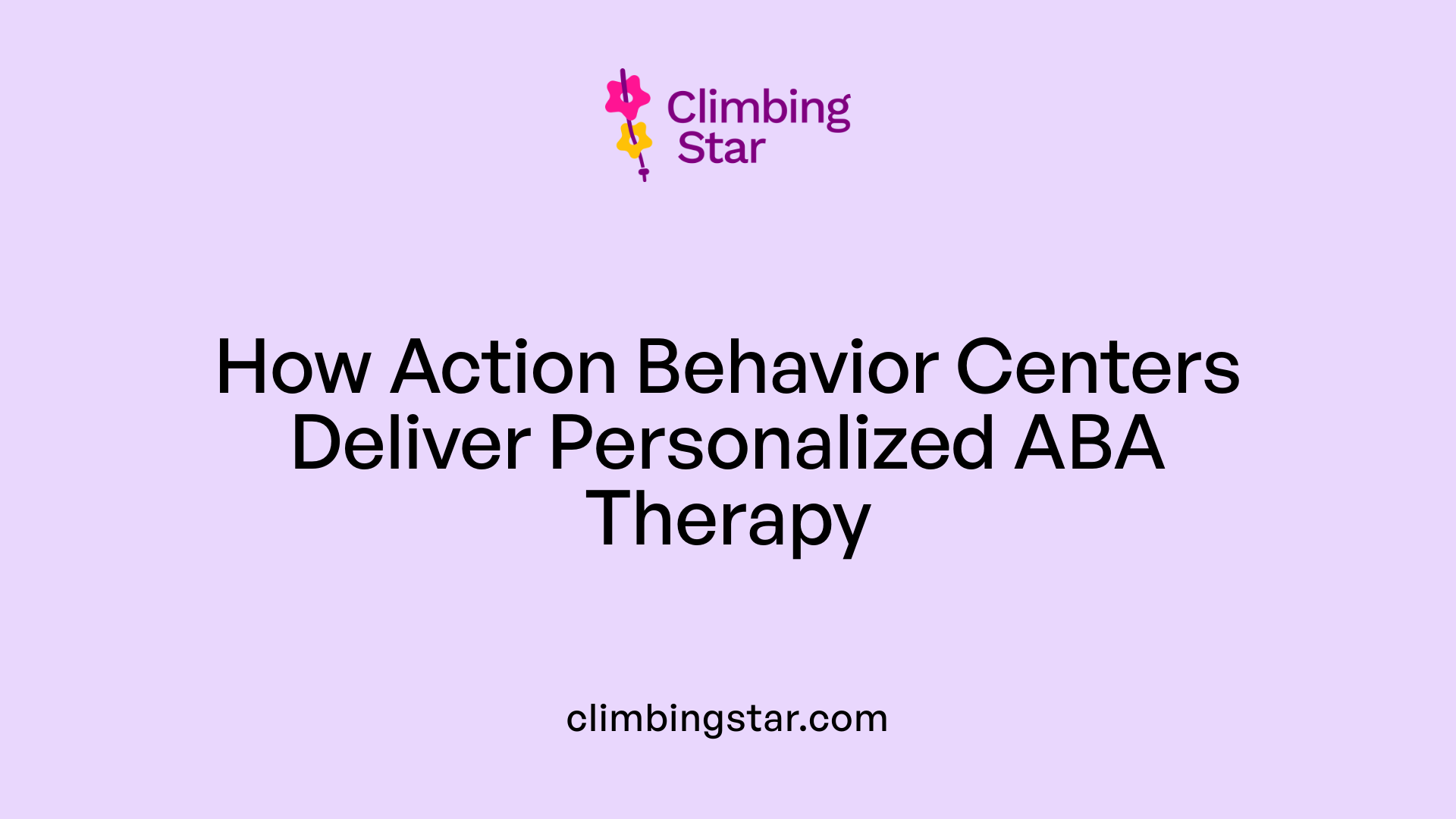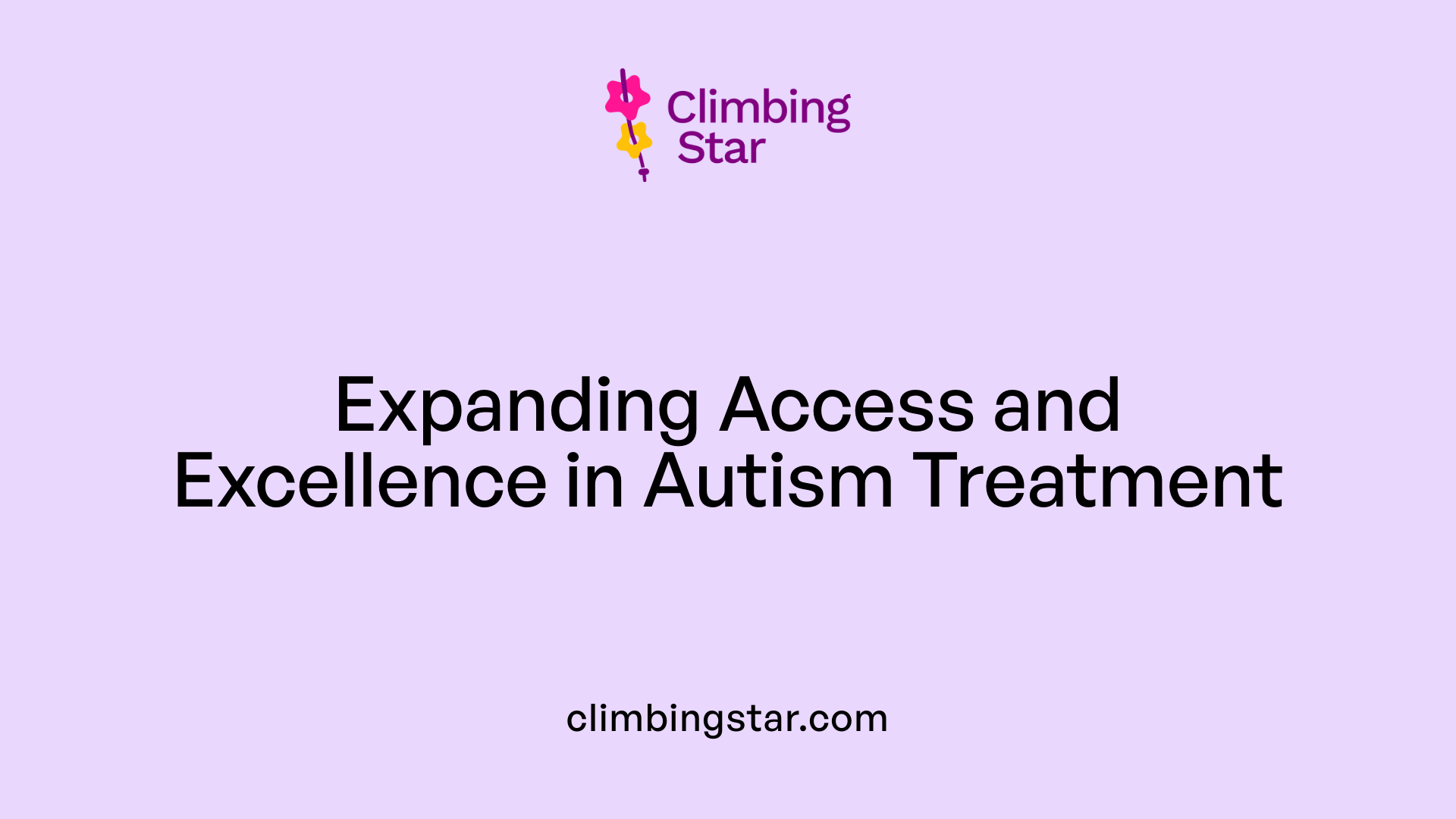Understanding the Role of ABA Therapy in Autism
Applied Behavior Analysis (ABA) therapy is a scientifically validated approach widely recognized as one of the most effective treatments for children diagnosed with autism spectrum disorder (ASD). Through personalized, data-driven interventions, ABA focuses on enhancing communication, social skills, and daily living abilities, while reducing problematic behaviors. Action Behavior Centers, a prominent provider in this field, exemplify the evolving landscape of ABA services. This article takes a comprehensive look at what Action Behavior Centers are, how they provide ABA therapy, and the impact of their work on children with autism.
Foundations and Goals of ABA Therapy

What is Applied Behavior Analysis (ABA) therapy?
Applied Behavior Analysis (ABA) therapy is a scientifically based approach aimed at understanding and changing human behavior, most notably in children with autism spectrum disorder (ASD). ABA focuses on increasing helpful behaviors such as communication, social skills, and self-care, while reducing harmful or problematic behaviors like self-injury. Treatment plans are personalized by Board Certified Behavior Analysts (BCBAs), based on thorough assessments and data analysis.
ABA uses techniques like positive reinforcement, where desired behaviors are encouraged to happen more often by rewarding them. Therapy methods may include structured tasks, play-based activities, and naturalistic teaching to promote skill generalization across various settings.
What are the key goals of ABA therapy in treating autism?
The primary goals of ABA therapy are to help children develop functional skills and gain independence. This includes building abilities in communication, daily living, social interaction, and academic performance. ABA aims to reduce behaviors that can cause harm or interfere with learning.
Importantly, ABA therapy respects neurodiversity. Instead of trying to change how children think or feel, it supports their strengths and helps them participate fully in society. The focus is on improving quality of life and fostering confidence by teaching skills that enhance independence.
How does positive reinforcement play a role?
Positive reinforcement is central to modern ABA. Desired behaviors are rewarded with praise, access to preferred activities, or tangible rewards, making those behaviors more likely to continue. This approach replaces outdated, harsh methods and ensures therapy is engaging and supportive.
How does ABA promote skill development and independence?
ABA breaks down complex skills into manageable steps, using methods like task analysis and prompting to teach each part. Children learn useful skills that apply to real life, such as self-care routines and social skills. The therapy also encourages generalizing these skills to different environments, increasing independence.
How does ABA respect neurodiversity?
A key aspect of today's ABA therapy is honoring the individuality of children with autism. Instead of pushing children to appear neurotypical, it supports their natural behaviors and interests. ABA aims to empower rather than change children’s core identity, helping them thrive in their unique ways.
Structure and Delivery of ABA Therapy at Action Behavior Centers

How is ABA therapy typically structured?
ABA therapy at Action Behavior Centers (ABC) is structured through individualized and systematic sessions. These sessions are designed by Board Certified Behavior Analysts (BCBAs) who tailor interventions based on each child's specific goals and needs. The therapy incorporates a blend of techniques, such as positive reinforcement, task analysis, prompting, and data collection. Sessions might use discrete trial training or naturalistic teaching methods, focusing on developing skills in communication, social interaction, and daily living.
ABC therapists assess and modify environmental factors using the "antecedent-behavior-consequence" (A-B-C) model to encourage desired behaviors while reducing harmful ones. Progress is continuously monitored through data analysis, enabling clinicians to adjust treatment plans dynamically for maximum effectiveness.
Who typically provides ABA therapy services?
ABA therapy at ABC is delivered by a team of qualified and credentialed professionals. Leading the team are BCBAs—graduate-level clinicians responsible for conducting assessments, developing individualized treatment programs, setting goals, and supervising other staff members. Board Certified Assistant Behavior Analysts (BCaBAs) and Registered Behavior Technicians (RBTs) implement therapy interventions directly with children under supervision.
This team approach ensures that therapy is both clinically sound and personalized. Paraprofessionals and trained therapists may also assist, especially during group-based or classroom-like settings such as those in the ABC Academy.
How does ABC emphasize positive reinforcement techniques?
Central to ABA at ABC is the use of positive reinforcement to encourage desired behaviors. Unlike earlier ABA methods that relied on punishments, ABC focuses on rewarding children’s efforts and successes, making therapy more engaging and supportive. This approach fosters skill acquisition in a nurturing, respectful manner.
What role do data collection and analysis play in therapy?
Data collection is critical at ABC, enabling clinicians to track measurable behavior changes objectively. Frequent assessments allow the team to evaluate the effectiveness of interventions and make informed decisions. This data-driven approach is vital to ensure individualized progress and optimize therapy outcomes.
What are play-based and naturalistic methods in ABA?
Modern ABA practices at ABC increasingly incorporate play-based and naturalistic teaching strategies. These methods reduce repetitiveness and align therapy with children’s interests and everyday behaviors, making learning more enjoyable and relevant. This shift supports broader engagement and skill generalization beyond therapy sessions.
How has the intensity of ABA therapy changed?
Compared to earlier intensive models requiring up to 40 hours weekly, ABC typically provides therapy in the range of 10 to 20 hours per week. This reduction makes treatment less demanding while maintaining effectiveness and supporting better family participation.
How does ABC ensure safe and ethical treatment methods?
Action Behavior Centers strictly adhere to ethical guidelines by rejecting outdated, punitive ABA techniques such as electric shocks. Instead, ABC prioritizes safe, respectful, and compassion-driven interventions that respect neurodiversity and emphasize child well-being. This commitment aligns with their goal to enhance independence and quality of life without trying to alter children’s thinking or feelings.
| Aspect | Description | Impact on Therapy |
|---|---|---|
| Therapy Structure | Individualized, systematic sessions using varied ABA techniques | Tailored skill development and behavior reduction |
| Provider Roles | BCBA oversight with BCaBAs and RBTs delivering therapy | Professional, evidence-based care |
| Positive Reinforcement | Reward-based strategies replacing punitive methods | Encourages motivation and engagement |
| Data Usage | Ongoing collection and analysis of behavior data | Informs personalized treatment adjustments |
| Play-based/Naturalistic Methods | Child-directed and interest-based learning approaches | More enjoyable, less repetitive sessions |
| Therapy Intensity | Moderate hours (10-20 per week) compared to earlier intensive programs | Balanced workload for child and family |
| Ethical Practices | Focus on safety, respect, and child well-being; no use of punishment techniques | Promotes dignity and neurodiversity acceptance |
Action Behavior Centers: Growth, Reach, and Clinical Excellence

Founding and Expansion of ABC
Action Behavior Centers (ABC) began as a single center in Austin, Texas, founded in 2016. Since its inception, ABC has grown remarkably, now operating over 200 centers across multiple states. This rapid expansion highlights ABC's commitment to providing quality autism therapy nationwide.
Number of Centers and States Served
ABC delivers its applied behavior analysis (ABA) services through more than 200 centers located in states including Texas, Arizona, Colorado, and Illinois. These strategically placed centers increase accessibility for families seeking evidence-based autism treatment.
Workforce of Graduate-Level Clinicians
The company employs approximately 1,100 graduate-level clinicians. This highly skilled workforce ensures that ABA therapies administered meet rigorous clinical standards and cater effectively to children's individual needs.
Recognition and Investment by Charlesbank
In 2022, private equity firm Charlesbank made a significant investment in ABC after extensively evaluating multiple ABA providers. This investment was driven by ABC’s strong clinical outcomes and a data-driven management team, underscoring the center’s leadership in autism treatment.
Data-Driven Clinical Outcomes
ABC emphasizes collecting and analyzing clinical data to continuously improve treatment effectiveness. Their commitment to measurable outcomes ensures that children receive therapies that increase independence and reduce autism-related behaviors.
Partnership with Texas State University
ABC formed a strategic partnership with Texas State University to develop a customized graduate ABA degree curriculum. This collaboration aims to train and prepare ABC employees as future board-certified behavior analysts (BCBAs), responding to the growing demand for qualified professionals.
Development of Future BCBAs
Graduate students enrolled in the ABA concentration, part of Texas State’s special education graduate program, are identified as future clinical supervisors for ABC clinics. The curriculum focuses on school- and clinic-based behavioral services expertise.
Geographic Presence
ABC’s network currently spans key cities including Dallas, Houston, San Antonio, Austin, and Phoenix, with plans for further expansion across Texas, Arizona, and Colorado. This geographic footprint strengthens their ability to deliver consistent, high-quality ABA therapy nationwide.
Innovative Programs and Services by Action Behavior Centers
ABC Academy program
Action Behavior Centers (ABC) has developed the ABC Academy program, specially designed for children aged 5 to 12. This program uniquely targets the developmental phase bridging early intervention and formal schooling, providing continuous support tailored to children's evolving needs.
Bridging early intervention to school support
The ABC Academy addresses the gap many children face as they transition from early therapy into structured school settings. By offering services that complement both home and school environments, ABC ensures that children receive consistent developmental guidance.
Classroom-like therapy model
One of the hallmarks of ABC Academy is its classroom-like atmosphere. This setting allows children to get accustomed to group learning, preparing them for the social and cognitive demands of traditional classrooms while still receiving intensive ABA therapy.
Social skills and confidence building
Beyond just academic skills, ABC Academy focuses on developing social skills and building confidence. Group instruction readiness and classroom participation help children practice interacting with peers, strengthening their communication and cooperative abilities.
Individualized goal setting
Every child enrolled in ABC Academy benefits from individualized goal setting. This personalized approach ensures therapy focuses on each child’s strengths and challenges, fostering meaningful progress tailored to their unique profile.
Multiple locations and expansion plans
ABC Academy operates across multiple locations, including Dallas, Houston, San Antonio, Austin, and Phoenix. The program is also expanding with new centers planned throughout Texas, Arizona, and Colorado, increasing access to specialized ABA services for more families.
The ABC Academy combines evidence-based ABA principles with innovative programming to support children's successful transition to school and beyond, emphasizing functional skill development and social inclusion.
Scientific Foundation and Evidence Supporting ABA and ABC’s Approach

Historical Context of ABA
Applied Behavior Analysis (ABA) has its roots in early 20th-century behaviorism, beginning with John B. Watson and later B.F. Skinner's work on radical behaviorism. The discipline scientifically studies behavior through operant and respondent conditioning. Over time, ABA developed key principles such as reinforcement, punishment, and functional behavior assessment (FBA), evolving as a structured approach to behavior change.
Scientific Principles Underlying ABA
ABA focuses on observable, measurable behaviors and their relationship with the environment. Techniques include task analysis, chaining, prompting, and extinction to teach new skills or reduce harmful behaviors through positive reinforcement. Functional behavior assessments identify the reasons behind behaviors to tailor interventions effectively.
Functional Behavior Assessments
FBAs assess the functional relationship between a behavior and environmental factors. This method allows practitioners to create targeted, individualized behavior plans, improving the effectiveness of ABA interventions and minimizing reliance on punitive measures.
Evidence Supporting ABA Effectiveness for Autism
Numerous scientific studies validate ABA's success in improving social, communication, and adaptive behaviors in children with autism spectrum disorder (ASD). Research shows that structured ABA interventions lead to significant gains in IQ, expressive and receptive language, and social skills. Early and intensive application of ABA has been linked to greater developmental progress.
Meta-Analyses and Research Studies
Meta-analyses examining various ABA programs reveal moderate to high effect sizes in multiple behavioral domains. Parental involvement amplifies positive outcomes by helping maintain and generalize skills across settings. Although some studies report mixed results, the consensus supports ABA as an evidence-based therapeutic approach.
Ethical Evolution of ABA Practices
Historically, some ABA practices included punishment measures now recognized as unethical, such as electric shocks. Modern ABA centers, like Action Behavior Centers (ABC), apply only positive reinforcement and play-based, naturalistic methods. These approaches respect autistic individuals' neurodiversity, focusing on skill-building and independence without attempting to alter intrinsic traits.
Broad Uses of ABA Beyond Autism
While best known for autism therapy, ABA techniques are also effective in animal training, substance abuse treatment, classroom behavior management, and organizational behavior management. This versatility underscores the scientific robustness and adaptability of ABA.
Respect for Neurodiversity in Modern ABA
Contemporary ABA emphasizes enhancing functional skills and social participation rather than enforcing neurotypical behaviors. ABA centers prioritize each child's strengths and interests, promoting independence and quality of life while honoring the unique characteristics of neurodiverse individuals.
| Topic | Description | Relevance to ABC's Approach |
|---|---|---|
| Historical Foundations | Origins in Watson's and Skinner's behaviorism, established behavioral science foundation | Groundwork for evidence-based, ethically sound therapy methods |
| Scientific Principles | Emphasis on operant conditioning, reinforcement, and function-based assessment | Informs ABC's individualized, positive reinforcement strategies |
| Functional Behavior Assessment | Identifies behavior-environment links to tailor interventions | Ensures personalized, effective ABA programs at ABC |
| Research Evidence | Meta-analyses and studies confirming ABA effectiveness for ASD | Supports clinical outcomes achieved by ABC |
| Ethical Evolution | Shift from punitive to positive, play-based methods | Reflects ABC's commitment to humane, respectful treatment |
| Broad Applications | Use in diverse settings beyond autism | Demonstrates ABA's versatility and research-backed methodologies |
| Neurodiversity Respect | Focus on independence and skill-building without erasing autistic traits | Aligns with ABC’s mission to empower children while honoring individuality |
Action Behavior Centers: Advancing Autism Care Through Evidence-Based ABA
Action Behavior Centers exemplify how modern ABA therapy continues to evolve by combining scientific rigor, compassionate care, and innovative education to support children with autism. By providing personalized, engaging, and ethically grounded treatment, ABC helps children not just reduce harmful behaviors but build the skills and confidence to thrive independently in their communities. Their collaboration with academic institutions and focus on workforce development further ensure that the future of ABA therapy remains strong and accessible. As research continues to validate ABA's effectiveness, organizations like Action Behavior Centers stand at the forefront, transforming lives and expanding potential across the United States.






